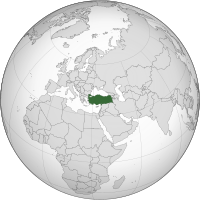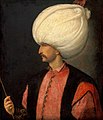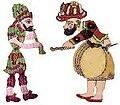Portal:Anatolia
Merhaba! Welcome to the Turkey portal

| |
Turkey (Turkish: Türkiye [ˈtyɾcije]), officially the Republic of Turkey, is a country located mainly on Anatolia in Western Asia, with a small portion on the Balkans in Southeast Europe. It shares borders with Greece and Bulgaria to the northwest; the Black Sea to the north; Georgia to the northeast; Armenia, Azerbaijan, and Iran to the east; Iraq to the southeast; Syria and the Mediterranean Sea to the south; and the Aegean Sea to the west. Turks form the vast majority of the nation's population and Kurds are the largest minority. Ankara is Turkey's capital, while Istanbul, the Imperial capital, is its largest city and financial centre.
One of the world's earliest permanently settled regions, present-day Turkey was home to important Neolithic sites like Göbekli Tepe, and was inhabited by ancient civilisations such as the Hattians, other Anatolian peoples and Mycenaean Greeks. Following the conquests of Alexander the Great which started the Hellenistic period, most of the ancient regions in modern Turkey were culturally Hellenised, which continued during the Byzantine era. The Seljuk Turks began migrating in the 11th century, and the Sultanate of Rum ruled Anatolia until the Mongol invasion in 1243, when it disintegrated into small Turkish principalities. Beginning in the late 13th century, the Ottomans united the principalities and conquered the Balkans, and the Turkification of Anatolia increased during the Ottoman period. After Mehmed II conquered Constantinople (Istanbul) in 1453, Ottoman expansion continued under Selim I. During the reign of Suleiman the Magnificent, the Ottoman Empire became a global power. From the late 18th century onwards, the empire's power declined with a gradual loss of territories. Mahmud II started a period of modernisation in the early 19th century. The Young Turk Revolution of 1908 restricted the authority of the Sultan and restored the Ottoman Parliament after a 30-year suspension, ushering the empire into a multi-party period. The 1913 coup d'état put the country under the control of the Three Pashas, who facilitated the Empire's entry into World War I as part of the Central Powers in 1914. During the war, the Ottoman government committed genocides against its Armenian, Assyrian subjects. After its defeat in the war, the Ottoman Empire was partitioned.
The Turkish War of Independence against the occupying Allied Powers resulted in the abolition of the Sultanate on 1 November 1922, the signing of the Treaty of Lausanne (which superseded the Treaty of Sèvres) on 24 July 1923 and the proclamation of the Republic on 29 October 1923. With the reforms initiated by the country's first president, Mustafa Kemal Atatürk, Turkey became a secular, unitary and parliamentary republic. Turkey played a prominent role in the Korean War and joined NATO in 1952. The country endured several military coups in the latter half of the 20th century. The economy was liberalised in the 1980s, leading to stronger economic growth and political stability. The parliamentary republic was replaced with a presidential system by referendum in 2017. Since then, the new Turkish governmental system under president Recep Tayyip Erdoğan and his party, the AKP, has often been described as Islamist and authoritarian. The latter's rule over the country has also led to numerous currency crises, increasing inflation and economic decline, as well as a rise in poverty.
Turkey is a regional power and a newly industrialized country, with a geopolitically strategic location. Its economy, which is classified among the emerging and growth-leading economies, is the twentieth-largest in the world by nominal GDP, and the eleventh-largest by PPP. It is a charter member of the United Nations, an early member of NATO, the IMF, and the World Bank, and a founding member of the OECD, OSCE, BSEC, OIC, and G20. After becoming one of the early members of the Council of Europe in 1950, Turkey became an associate member of the EEC in 1963, joined the EU Customs Union in 1995, and started accession negotiations with the European Union in 2005. (Full article...)
Selected article -
The confiscation of Armenian properties by the Ottoman and Turkish governments involved seizure of the assets, properties and land of the country's Armenian community. Starting with the Hamidian massacres in the mid-1890s and peaking during the Armenian genocide, the confiscation of the Armenian property lasted continuously until 1974. Much of the confiscations during the Armenian genocide were made after the Armenians were deported into the Syrian Desert with the government declaring their goods and assets left behind as "abandoned". Virtually all properties owned by Armenians living in their ancestral homeland in Western Armenia were confiscated and later distributed among the local Muslim population.
Historians argue that the mass confiscation of Armenian properties was an important factor in forming the economic basis of the Turkish Republic while endowing the Turkish economy with capital. The appropriation led to the formation of a new Turkish bourgeoisie and middle class. (Full article...)General images
Did you know -
- ... that it was discovered that about 10,000 Muslim graves in Cebeci Asri Cemetery, Ankara, Turkey were not oriented in the direction required by Islam? (March 29, 2007) Wikipedia:Recent additions 130
- ... that the Balık sisters from Turkey claim to be the only identical twins who are both professional opera singers? (March 22, 2007) Wikipedia:Recent additions 129
- ... that Ottoman architect Mimar Sinan erected a Koranic school and an elementary school near the Ese Kapi Mosque in Istanbul? (May 9, 2012)
- ... that the land of Haydarpaşa Cemetery, a burial ground in Istanbul, Turkey for British Commonwealth soldiers from three wars, belonged to Suleiman the Magnificent? (May 16, 2007) Wikipedia:Recent additions 141
- ... that the McGhee Center for Eastern Mediterranean Studies in Alanya is run by Georgetown University as the only independent study program in Turkey? (November 12, 2007) Wikipedia:Recent additions 185
Selected picture
Selected biography -
Mustafa İsmet İnönü (Turkish pronunciation: [isˈmet ˈinœny]; 24 September 1884 – 25 December 1973) was a Turkish army officer and statesman, who served as the second President of Turkey from 11 November 1938 to 22 May 1950, and its Prime Minister three times: from 1923 to 1924, 1925 to 1937, and 1961 to 1965.
İnönü is acknowledged by many as Mustafa Kemal Atatürk's right-hand man, with their friendship going back to the Gallipoli campaign. In the Greco-Turkish War of 1919–1922, he served as the first Chief of the General Staff (Turkish: Erkân-ı Harbiye-i Umumiye Reis Vekili) from 1922 to 1924 for the regular Turkish army, during which he commanded the forces of the battles of First and Second İnönü. Mustafa Kemal bestowed İsmet with the surname İnönü, where the battles took place, when the 1934 Surname Law was adopted. He was also chief negotiator in the Mudanya and Lausanne conferences for the Ankara government, successfully negotiating away the Sevre treaty for the Treaty of Lausanne. As his Prime Minister for most of his presidency İnönü executed many of Atatürk's modernizing and nationalist reforms. İnönü is also noted of being the main perpetrator of the Zilan Massacre. (Full article...)Selected video -
Selected quote -
| “ | Everything we see in the world is the creative work of women. | ” |
Recognized content
Provinces
Topics
Categories
Related portals
WikiProjects
- European Union WikiProject
- Ottoman military history WikiProject
- Greek and Turkish wikipedians cooperation board
- European history WikiProject
- Eastern Europe WikiProject · Caucasia WikiProject
- Balkan military history WikiProject
- Islam WikiProject
- Countries WikiProject · Western Asia WikiProject
- Ancient Near East WikiProject
- Geography WikiProject
Turkish wikipedia
| There is a Turkish version of Wikipedia, the free encyclopedia. |
Wikimedia
Portals
This page was last updated at 2022-01-02 13:23 UTC. Update now. View original page.
All our content comes from Wikipedia and under the Creative Commons Attribution-ShareAlike License.






















































































